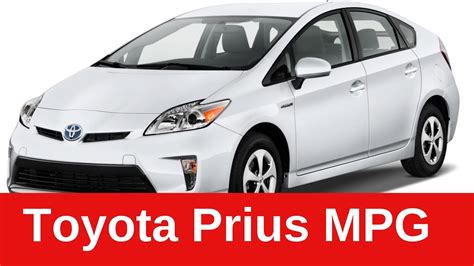Introduction
The 2005 Toyota Prius is a compact hybrid vehicle known for its exceptional fuel efficiency. Its innovative hybrid powertrain combines a gasoline engine with an electric motor, resulting in significantly lower fuel consumption compared to traditional gasoline-powered cars. This article will delve into the factors that contribute to the Prius’s impressive mileage, offering a comprehensive guide to optimizing fuel economy and reducing environmental impact.

Hybrid Powertrain: The Foundation of Fuel Efficiency
The 2005 Toyota Prius features a parallel hybrid powertrain, which allows the gasoline engine and electric motor to work independently or in tandem to deliver optimal efficiency. The electric motor provides assistance during acceleration and at low speeds, reducing the reliance on the gasoline engine and saving fuel. The hybrid system also employs regenerative braking, which captures energy during braking and stores it in the battery for later use.
Fuel Economy Figures: Real-World Results
The United States Environmental Protection Agency (EPA) rates the 2005 Toyota Prius with an estimated fuel economy of 60 mpg in the city and 51 mpg on the highway. These figures reflect real-world driving conditions and are a testament to the hybrid powertrain’s effectiveness in reducing fuel consumption.
Factors Affecting Fuel Efficiency
Driving Habits: The Human Element
Driving habits play a significant role in determining fuel economy. Smooth acceleration, gradual braking, and maintaining a steady speed can reduce fuel consumption. Additionally, avoiding excessive idling and using cruise control on highways can further improve mileage.
Tire Pressure: A Critical Factor
Maintaining proper tire pressure is crucial for optimal fuel efficiency. Underinflated tires increase rolling resistance, which requires more energy to overcome and results in reduced mileage. Regularly check and adjust tire pressure to the manufacturer’s recommended levels.
Load Capacity: Less is More
Overloading your Prius can negatively impact fuel economy. Excess weight increases aerodynamic drag and puts strain on the powertrain, resulting in higher fuel consumption. Minimize unnecessary cargo and ensure the vehicle is not carrying more weight than necessary.
Maintenance: The Key to Longevity
Regular maintenance is essential for maintaining fuel efficiency. Clean air filters improve engine efficiency, while properly functioning spark plugs ensure optimal combustion. Adhering to the manufacturer’s scheduled maintenance intervals can extend the lifespan of the vehicle and preserve its fuel-saving capabilities.
Fuel-Saving Strategies
Eco Mode: Optimized Efficiency
2005 Toyota Prius models come equipped with an Eco mode, which adjusts various systems to prioritize fuel efficiency. This mode modifies throttle response, reduces air conditioning usage, and optimizes battery charging to maximize mileage.
Intelligent Powertrain Management
The Prius’s intelligent powertrain management system monitors driving conditions and seamlessly switches between electric and gasoline power to deliver the best possible fuel economy. This system adapts to different driving scenarios, such as stop-and-go traffic or open highways, to optimize performance.
Aerodynamic Design: Reducing Drag
The 2005 Toyota Prius features a sleek, aerodynamic design that reduces air resistance. The streamlined shape minimizes drag, which helps improve fuel efficiency by reducing the power required to overcome wind resistance.
Hybrid Synergies Drive: Advanced Technology
Toyota’s Hybrid Synergy Drive (HSD) system is a key contributor to the Prius’s fuel efficiency. The HSD system combines the gasoline engine and electric motor with a planetary gearset to create a seamless and efficient power delivery. This advanced technology optimizes torque and power distribution, resulting in improved mileage.
Benefits of Improved Mileage
Reduced Fuel Costs: Savings at the Pump
Improved fuel economy directly translates into significant savings at the pump. With the rising cost of gasoline, the Prius’s exceptional mileage provides substantial financial benefits over time, reducing fuel expenses and freeing up money for other priorities.
Environmental Sustainability: Reducing Carbon Emissions
The Prius’s high fuel efficiency contributes to reducing environmental impact. By consuming less gasoline, the vehicle produces fewer greenhouse gas emissions, mitigating climate change and preserving air quality.
Increased Driving Range: Less Time at Gas Stations
With its impressive fuel economy, the Prius offers increased driving range, allowing you to travel longer distances between fill-ups. This extended range eliminates the need for frequent stops at gas stations, saving time and reducing the hassle associated with refueling.
Customer Motivations and Pain Points
Motivations:
- Financial Savings: Customers prioritize fuel efficiency to reduce their monthly fuel expenditures.
- Environmental Concerns: Individuals are increasingly motivated to reduce their carbon footprint and embrace sustainable transportation options.
- Convenience: Enhanced fuel efficiency reduces the hassle of frequent gas station stops and offers a more convenient driving experience.
Pain Points:
- Initial Cost: Hybrid vehicles often have a higher initial purchase price compared to gasoline-only counterparts.
- Limited Availability: Prius and other hybrid models can sometimes experience limited availability in certain markets.
- Infrastructure Challenges: Access to charging stations for plug-in hybrids or electric vehicles can be a concern for some customers.
Effective Strategies for Selling 2005 Prius Mileage
Emphasize the Savings:
Highlight the substantial fuel savings customers can achieve with the Prius’s exceptional mileage, quantifying the potential savings in dollars and percentages.
Promote the Environmental Benefits:
Showcase the environmental benefits of the Prius, such as reduced greenhouse gas emissions and improved air quality, to appeal to eco-conscious customers.
Offer Test Drives:
Provide potential customers with test drives to experience the Prius’s fuel efficiency firsthand and demonstrate its capabilities in real-world driving conditions.
Target Environmentally Conscious Audiences:
Reach out to environmental organizations, nature enthusiasts, and individuals committed to sustainable practices to promote the Prius’s environmental credentials.
Conclusion
The 2005 Toyota Prius Mileage is a comprehensive guide that explores the factors contributing to the vehicle’s exceptional fuel efficiency. By optimizing driving habits, maintaining proper tire pressure, minimizing load capacity, and following regular maintenance schedules, owners can maximize the Prius’s mileage and enjoy the benefits of reduced fuel costs, increased driving range, and a positive environmental impact. The Prius’s hybrid powertrain, intelligent powertrain management, and aerodynamic design work in concert to deliver impressive fuel economy, making it an ideal choice for environmentally conscious drivers seeking financial savings and sustainable transportation.
